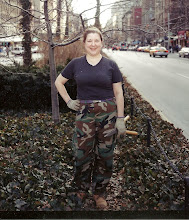I love "weather." To be more clear, I love extreme weather. I love it when it's incredibly hot or cold; huge, violent thunderstorms; wild winds; massive snowstorms. Now, to be honest, as a gardener largely dependent on nature, I'm not too crazy about droughts. But other weather histrionics fascinate me, and I love being outdoors when they take place.
Tonight in New York City is the coldest night in the last two years. When I went out, very late in the evening, it was 13 degrees; now it's 10. I took a walk down to the Park to see how things were. I was lashed by the winds that came off of the park and whipped up the streets; much like water flowing through a funnel, as the wind gets more concentrated, the flow is also more concentrated and forceful. It was so cold, I thought I might have a touch of frostbite. Nope, just REALLY cold extremities!
Despite this discomfort, I don't think I could live year round in a place that didn't have "weather." The very South (Florida, Louisiana, Mississippi, Alabama, etc.), or the West Coast would be so monotonous year-round, I would think. No contrast from April to September then October to March (to divide the year roughly); just the same, year long, comfortable, temperate atmosphere, with the occasional hurricane or wildfire.
Has anyone ever dared to wonder if that temperate climate is the reason so many areas in the equatorial zone have been subject to conquest by people from more variable climates, then, when the conquerors have been thrown off or withdrawn, have been unable to make their own governments, markets, etc.? Why is it that so much of Africa seems to be in constant turmoil and ungovernable, and why so much of southeast Asia and areas of Central and South America seem to also be in a continual state of confusion, or under the thumbs of dictators?
Could it be that the progression and contrast of actual "seasons" contributes to a society's ability to organize hierarchically and interactively, whereas no "seasons," just one long, endless summer, might make a group of people minimally able to organize? That is, as a whole, the entire society isn't able to organize into an interactive, self-supporting group because they don't necessarily need to rely on others, or even each other, for their existence?
I am aware of the terrible tsunami which devastated Southeast Asia in December, 2006. However, I am also aware that most of the footage that was shown was of tourist hotels, shopping blocks and other "westernized" areas being devastated. Very little was seen of the "locals." Is this because of lack of interest, or because the truth is many of these people, after mourning the massive losses of life, could simply raise another roof fairly readily and have their needs met, again, nearly immediately, by local small merchants? I do not mean to minimize the losses of life or property in any way, and I know that billions of dollars in aid went into Southeast Asia after the tsunami. But, to whom did that aid go; the locals, or the "westernized" areas, to get the tourist business back up to speed?
One of the problems with "Western" lifestyles is that we are so totally dependent on complex networks, not only of power and water, but also of food, medicine and other necessities. In New York City, historically, one of the greatest problems of major snowstorms has been the fact that food delivery trucks can be delayed in getting into the City. This led to folks eating sparrows and pigeons during the blizzard of 1888. There was nothing else available; some people had to resort to "hunting and gathering" to survive. This is also why, when there is a blizzard warning for the City, people still run to the store and clean the shelves. Who knows when the next delivery of brie and Stoned Wheat Thins will arrive?
Another thing I am surmising, in contrasting these two types of environments and lifestyles, is that those of us who live in more "interdependent" areas: urban, industrialized, food-dependent, weather relevant, need to think about being prepared for difficult times. That is, we need to have food, energy sources and water on hand, and need to be able to get from place to place on our own. I don't want to sound like an "End of Days" evangelist, but I think, given where we are and the recent actions of our government (who seem to care nothing about New York City) we need to be prepared in some ways. We can learn from these extreme weather occasions; to gather what we need to stay safe, and what we need to have with us to be able to get out and survive.
If we lived in a more temperate zone, we wouldn't have to worry so much. Then again, we probably wouldn't have DSL, cable or even reliable hot water, so thank technology for small favors!
More later,
Catbird

No comments:
Post a Comment